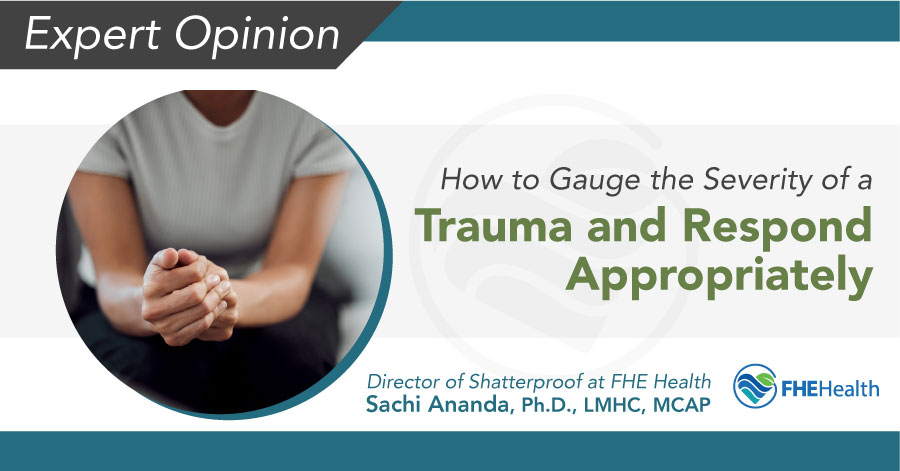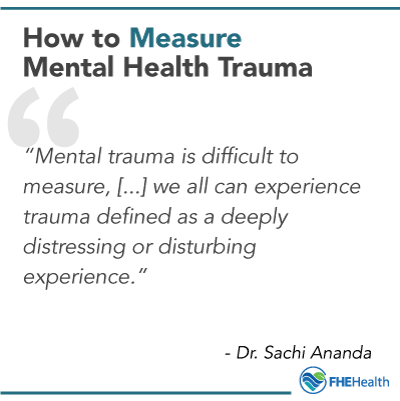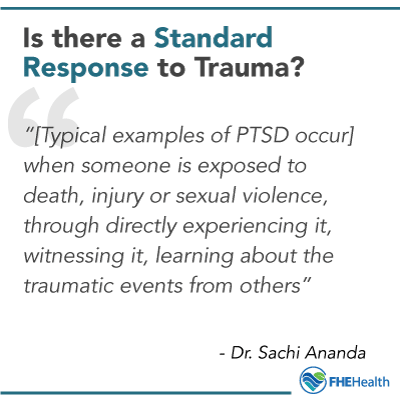
This article has been reviewed for accuracy by our peer review team which includes clinicians and medical professionals. Learn more about our peer review process.
Most people will experience a traumatic event during their lifetime, according to the National Center for PTSD. It reports that six out of 10 men and five out of 10 women are affected by trauma, and that the nature of their trauma can depend to some degree on their gender:
- Women are more vulnerable to sexual assault and sexual abuse in childhood.
- Men are more likely to experience accidents, physical assault, combat, or disaster, or to witness death or injury.
Trauma and Mental Health
 Trauma is not just the experience of a terrible event but the mental and emotional response to it. There is also an important distinction to be made between trauma and PTSD. Not everyone who experiences trauma will develop post-traumatic stress disorder. In fact, only a small proportion of trauma victims will develop symptoms of PTSD. Two people may go through the same harrowing experience but respond very differently. (The experience is often very subjective.)
Trauma is not just the experience of a terrible event but the mental and emotional response to it. There is also an important distinction to be made between trauma and PTSD. Not everyone who experiences trauma will develop post-traumatic stress disorder. In fact, only a small proportion of trauma victims will develop symptoms of PTSD. Two people may go through the same harrowing experience but respond very differently. (The experience is often very subjective.)
It’s also possible to prevent trauma from becoming PTSD. That makes responding appropriately of critical importance. The question that many families ask in the immediate aftermath of trauma is: How do you gauge the severity of post-traumatic symptoms and respond appropriately? Are there ways to measure PTSD and its severity?
These and other questions about PTSD were the focus of a recent interview with Dr. Sachi Ananda, Ph.D., LMHC, MCAP. She specializes in trauma therapy, including EMDR (“Eye Movement Desensitization Reprocessing”), and is the director of FHE Health’s Shatterproof program for first responders. In addition to this professional expertise, Dr. Ananda has personal experience with PTSD and its effects, having grown up in a military family. For her expert insights into trauma, PTSD, when to get help, and trauma treatment, read on.
How to Measure Trauma Exposure and/or Gauge the Severity of Trauma and PTSD
Measuring trauma exposure and gauging the severity of a trauma is more about a person’s post-traumatic response to the event(s) and whether they are experiencing symptoms of PTSD. Dr. Ananda explained that while there is no official clinical diagnostic measure that distinguishes levels of PTSD severity, for some people “the symptoms of PTSD can be more frequent and debilitating.”
Measuring Mental Trauma
“Mental trauma is difficult to measure,” Dr. Ananda said. She added that “we all can experience trauma defined as a deeply distressing or disturbing experience.”
What, then, is different about mental trauma? It signifies that “the trauma has negative psychological effects” and “can be severe if it is causing distress and/or significant impairment in social, occupational, or other areas of functioning.”
What Are the Different Types of PTSD?
“There are different types of trauma and stress-related disorders,” according to Dr. Ananda. This may come as a surprise. Perhaps because of PTSD’s higher prevalence and the greater public awareness surrounding it, there is a common misconception that PTSD is the only trauma disorder that clinicians diagnose. In a similar vein, many people aren’t aware that there are variations of PTSD. However, awareness of these other trauma and stress-related disorders can help individuals and families better detect symptoms that they might not otherwise recognize as negative mental health effects of trauma and stress.
What are the other different types of PTSD? Dr. Ananda mentioned four:
- “Reactive Attachment Disorder and Disinhibited Social Engagement Disorder are related to unhealthy emotional and physical responses in children due to abuse or neglect.
- Acute Stress Disorder has similar symptoms to PTSD but specifically happens within three days to one month after exposure to trauma.
- Adjustment Disorder also mimics PTSD symptoms but occurs within three months of the trauma and lasts no more than six months. Adjustment disorder can include depression, anxiety, and conduct issues. PTSD, in contrast, is a diagnosis of its own with different specifiers of dissociative symptoms related to depersonalization or derealization.” (By “depersonalization” and “derealization,” Dr. Ananda was referring to “a lack of ability to distinguish what’s real from what’s not real.”)
Typical Signs and Examples of More Severe PTSD
 Is it possible to speak of “typical examples” of PTSD? Apparently so. Speaking from experience, Dr. Ananda said common examples have been “when someone is exposed to death, injury or sexual violence, through directly experiencing it, witnessing it, learning about the traumatic events from others, or experiencing repeated exposure to the details of the traumatic event (such as with first responders).”
Is it possible to speak of “typical examples” of PTSD? Apparently so. Speaking from experience, Dr. Ananda said common examples have been “when someone is exposed to death, injury or sexual violence, through directly experiencing it, witnessing it, learning about the traumatic events from others, or experiencing repeated exposure to the details of the traumatic event (such as with first responders).”
As for signs of PTSD to look for? Dr. Ananda cited the following symptoms:
- intrusive and distressing memories and flashbacks
- physiological and psychological symptoms that involve reactions to internal or external cues related to the trauma, such as doing anything to avoid reminders of the trauma
- mood changes or negative thought patterns due to the traumatic event(s)
- detachment or estrangement from others
- a lack of desire to participate in activities that one used to enjoy
- an inability to experience happiness or joy
- irritability with angry outbursts for no reason
- sleep problems
- a constate state of being on guard and hypervigilant
If any of these long term effects of trauma are impacting your or a loved one’s quality of life, don’t delay in consulting a mental health professional. Sometimes the best next step is to schedule an appointment with a psychiatrist who can medically diagnose and treat symptoms. They may also be able to provide a referral to a therapist who is licensed in EMDR or other evidence-based trauma therapies.
Are you experiencing disturbing memories and flashbacks? Can’t sleep? Our PTSD specialists may be able to help. Start feeling better today.






